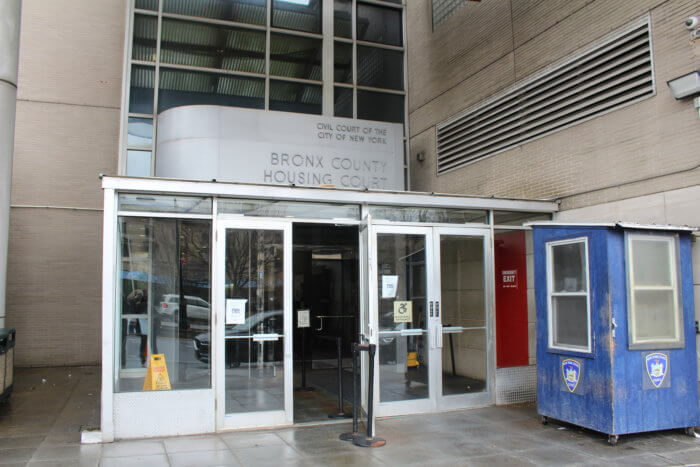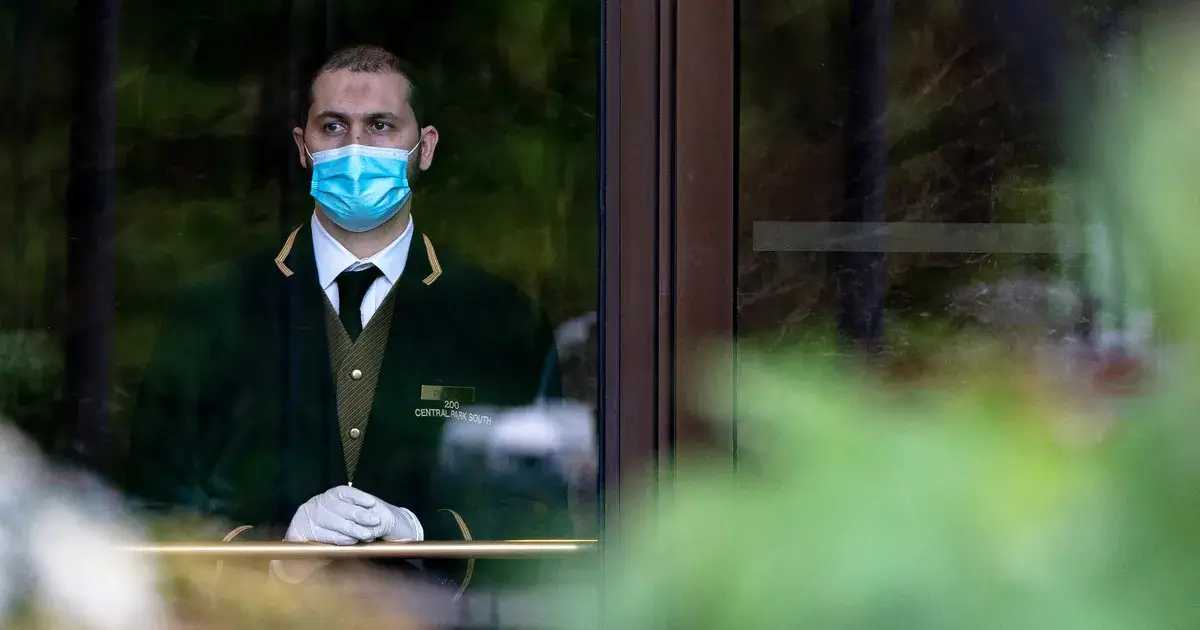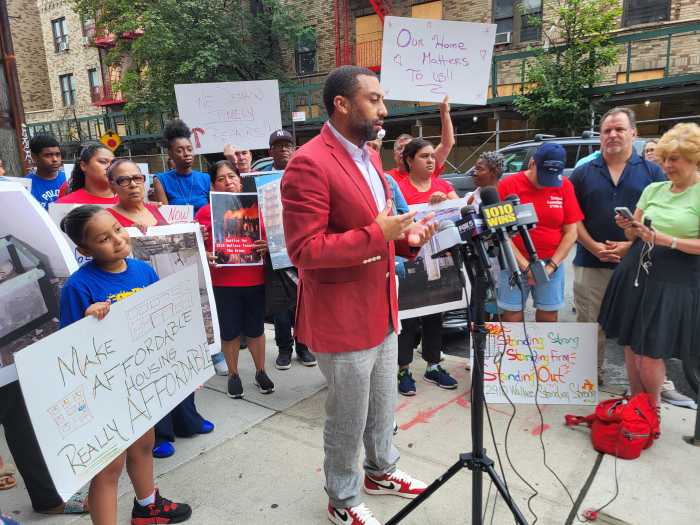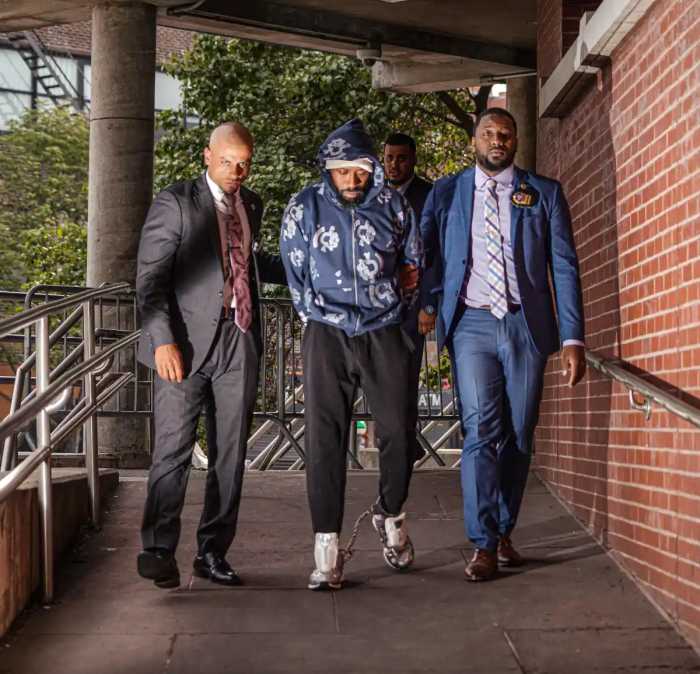The COVID-19 pandemic undoubtedly upended New York’s housing industry and its workforce, and it’s becoming a key factor in how expiring pre-pandemic contracts and bargaining agreements are being renegotiated.
Bronx residential building workers — a workforce that includes thousands of door attendants, superintendents and porters — had become essential workers during the COVID-19 pandemic, as they address daily housing issues for Bronxites.
According to Anthony Renne, a doorman at 5900 Arlington Ave. in North Riverdale, his job changed drastically from front desk work to the sanitization and disinfection of building surfaces and incoming packages among other duties, amid high risk to contract the virus due to his immunocompromised status.
“I have an underlying heart issue that I take medication for. It was scary being on the front desk all the time, I was exposed to so many people. We tragically had some residents pass away from COVID. The deliveries, we disinfected all the packages, doorknobs, it was crazy,” said Renne. “When residents got COVID, they couldn’t leave their apartments – so we delivered food to their door, because delivery people weren’t allowed in the building. Porters personally picked up their trash. We were always cleaning, keeping ourselves and residents safe. Masks, gloves. It was a tough time.”
Fast-forward three years, roughly 2,400 Bronx building service workers say their employers, Bronx Realty Advisory Board (BRAB), are attempting to “gut” their employer-paid health benefits in recent contract negotiations with the 32BJ SEIU bargaining committee.
Among a list of proposals floated by BRAB, is a plan to limit health coverage to 5 Star Centers, private practitioners that partner with 32BJ to provide care for members for $0 co-pays. Additionally, building service workers and their representing union said that BRAB has offered a separate contract for superintendents that would eliminate overtime, just cause termination and strip their right to cross the picket line.
The collective bargaining agreement between service workers and BRAB, signed before the pandemic in 2019, expires at midnight on March 14.
The current contract covers 1,404 workers at 433 co-ops, condos and apartment buildings. But the negotiations also impact 374 buildings and 950 other workers who are covered by a linked “Bronx Master Independent Agreement.” A further 87 buildings and 358 members are covered by separate contracts that are indirectly impacted, according to 32BJ SEIU.
Workers are set to rally Wednesday outside the Bronx Supreme Court where they will also vote on a resolution to authorize a strike if necessary.
“These workers were there when the Bronx needed them most,” said Shirley Aldebol, 32BJ executive vice president and director of the Bronx Residential Division. “They took no days off, sacrificing and risking their own lives so Bronx residents could quarantine and work from home. They are an essential part of what makes the Bronx what it is. They deserve fair wage increases and the continuation of their employer-paid health insurance. They will not be divided.”
The Bronx Realty Advisory Board was founded in the 1940s to provide full labor representation to owners of Bronx residential buildings whose maintenance employees are members of 32BJ SEIU.
Billy Schur, president of BRAB, told the Bronx Times that the union’s mischaracterization of contract talks and provisions is “extreme,” but didn’t place blame on workers. Instead, Schur said it’s been a “difficult environment” for New York’s property owners amid a backlog in housing court and rental payments due to the state’s rent moratorium during the pandemic.

Schurr said that while the state’s pause on evictions, which became law in June 2020 before expiring January 2022, had good intentions, the aftermath has led to an environment where small-time property owners face financial shortfalls and tenants are burdened by months of overdue rent.
“We all must recognize the realities of the unprecedented economic situation that property owners face both with tremendous inflation impacting operating costs, the disastrous state of housing court and record level of accumulated rental arrears, the impact of the (state) Legislature on Rent Regulated Housing and the combined impact of all these factors on both revenues and expenses associated with this type of housing,” said Schurr.
During the pandemic just more than $40 million was paid out to Bronx property owners through the Landlord Rental Assistance Program (LRAP) to keep them afloat, according to BRAB. This is in addition to the $644 million distributed to Bronx property owners through the Emergency Rental Assistance Program (ERAP).
Inflation, other building owners attest to the Bronx Times, is also putting a crunch on their wallets, citing the high cost of building materials. The cost of building assessments in the Bronx has risen by roughly 11%, according to the Bureau of Labor Statistics consumer price index.
“Inflation and rising costs impact everyone — workers and owners alike. The argument for major wage increases relies primarily on inflation, but owners’ costs have risen just as much if not more,” said Oscar Perez, a Bronx building owner. “Any new agreement must reflect that economic pressure impacts us all – not just workers.”
But workers remain united and diligent that increased wages and a protection of their health care plans are front and center in any new contract. Last April, nearly 30,000 Manhattan building workers had threatened a strike over wage conditions, before receiving a new contract that bumps door attendant pay to $62,000 by the end of the contract in 2026.
“I have lived in the Bronx all my life – I used to live across the street from the building where I live and work now,” said superintendent Gretel Joel Tejeda. “I love being a super, but I’m only making $17/hour, living in a one bedroom with two kids and my fiancé. I’m hopeful we can come to an understanding, a fair agreement on a new contract.”




















